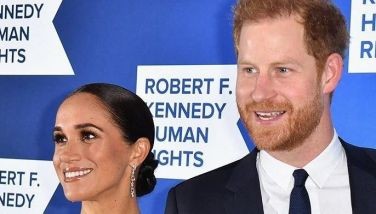Words on Coltrane

June 16, 2002 | 12:00am
There are two known extant recordings of the John Coltrane song A Love Supreme – the original by the master saxophonist recorded with his quartet in the early ’60s and which appears in a very best of collection under the Impulse label; and the version by the two guitarists, John McLaughlin and Carlos Santana, that came out in the duo’s only collaborative album, Love Devotion Surrender in the ’70s.
In both records, the bass lays out the opening groove through which the rest of the musical entourage follows with corresponding pyrotechnics and improvisation, gradually pushing the song almost to the ether and just as gently setting the listener back down again on terra firma. Or is it possible to land on solid ground again after hearing A Love Supreme? If Coltrane’s own spiritual inclinations are to be the cue, music should be able to take us to a higher plane or at the very least sort of rearrange our worldview.
Of course what a lone alto saxophone can accomplish, two guitars try to duplicate with modest success. Both however are keys to their respective decades; Coltrane’s record coming before Vietnam and when experiments with various drugs and their relation to the creative process were just beginning, because before the summer of love was a spring of despair; McLaughlin’s and Santana’s reflecting the kind of weird time when America’s Asian war was just wrapping up to disastrous results, but what could the fiery double guitar solos care about the strife more than an ocean away?
It might be that life in these same islands was as different from what Coltrane, Santana and McLaughlin were going through in their own, how shall we describe it, golden period thirty-something years ago. Love Devotion Surrender itself was bought in a rundown second hand record bar either in Escolta or Quiapo, going at a fine bargain.
The album title is not to be confused with a song of the same name that appeared in Santana’s Welcome album of the all-white cover, and wherein McLaughlin too does some session guitar in a couple of cuts.
What it is it about Coltrane that made him a major influence on artists of succeeding generations, stretching up to our own Binky Lampano of the studied blues growl?
And what made a Pinay jazz singer in a Malate lounge laugh when we requested her to sing, torch-style, any tune by Coltrane if she could muster the lyrics on the spot?
"Coltrane? Kabarkada niya ba si Thelonious Monk?" she said.
Fact is Coltrane did play in the same band with Monk during a limited period, and which collection to this day must already be one for the (record) books.
Imagine if that singer, who for the moment must remain nameless and faceless, had begun singing a bar or two from My Favorite Things, of which both Coltrane and Julie Andrews (from The Sound of Music) have versions. We might have all been stumped on our tracks then.
Coltrane himself has recorded at least two versions of Everytime We Say Goodbye; one that appeared in his Best of collection and recorded live in Paris, and the other a studio take in the album My Favorite Things. Both though were with his regular quartet composed of McCoy Tyner on piano, Elvin Jones on drums, and Steve Davis (studio take) and Jimmy Garrison (live version) alternating on bass.
The song sounds like an old Broadway tune, and Coltrane redefines the parameters of melancholy in both renditions, as he does in such originals as Naima and After the Rain.
Perhaps what endeared Coltrane to musicians of succeeding generations was the elasticity if not downright amorphousness of his compositions, on which the instrumentalist could improvise almost endlessly and yet retain a distinct Coltrane feel.
But what are we saying? When rock musicians listen to a lot of Coltrane, it is merely to study the possibility of expanding, even branching out to less restricted forms.
The late Duane Allman listened to the man’s saxophone, as did Eric Clapton, and many other blues guitarists who were trying to approximate the same blues mindset.
Same was true for McLaughlin and Santana, who together reworked A Love Supreme to certify it as a modern-day classic, one of the few songs we’ve heard that tunes in the listener to an esoteric spirituality that is at the same time curiously within reach through the power of music.
And not for nothing has the next generation saxophonist Wayne Shorter been called something of a Coltrane Jr., and how Lampano swears by the dead man’s saxophone, to the extent of going to the deep American south to be exposed to the mysteries of cotton-picking as prologue to either sheet music or good old oido.
In both records, the bass lays out the opening groove through which the rest of the musical entourage follows with corresponding pyrotechnics and improvisation, gradually pushing the song almost to the ether and just as gently setting the listener back down again on terra firma. Or is it possible to land on solid ground again after hearing A Love Supreme? If Coltrane’s own spiritual inclinations are to be the cue, music should be able to take us to a higher plane or at the very least sort of rearrange our worldview.
Of course what a lone alto saxophone can accomplish, two guitars try to duplicate with modest success. Both however are keys to their respective decades; Coltrane’s record coming before Vietnam and when experiments with various drugs and their relation to the creative process were just beginning, because before the summer of love was a spring of despair; McLaughlin’s and Santana’s reflecting the kind of weird time when America’s Asian war was just wrapping up to disastrous results, but what could the fiery double guitar solos care about the strife more than an ocean away?
It might be that life in these same islands was as different from what Coltrane, Santana and McLaughlin were going through in their own, how shall we describe it, golden period thirty-something years ago. Love Devotion Surrender itself was bought in a rundown second hand record bar either in Escolta or Quiapo, going at a fine bargain.
The album title is not to be confused with a song of the same name that appeared in Santana’s Welcome album of the all-white cover, and wherein McLaughlin too does some session guitar in a couple of cuts.
What it is it about Coltrane that made him a major influence on artists of succeeding generations, stretching up to our own Binky Lampano of the studied blues growl?
And what made a Pinay jazz singer in a Malate lounge laugh when we requested her to sing, torch-style, any tune by Coltrane if she could muster the lyrics on the spot?
"Coltrane? Kabarkada niya ba si Thelonious Monk?" she said.
Fact is Coltrane did play in the same band with Monk during a limited period, and which collection to this day must already be one for the (record) books.
Imagine if that singer, who for the moment must remain nameless and faceless, had begun singing a bar or two from My Favorite Things, of which both Coltrane and Julie Andrews (from The Sound of Music) have versions. We might have all been stumped on our tracks then.
Coltrane himself has recorded at least two versions of Everytime We Say Goodbye; one that appeared in his Best of collection and recorded live in Paris, and the other a studio take in the album My Favorite Things. Both though were with his regular quartet composed of McCoy Tyner on piano, Elvin Jones on drums, and Steve Davis (studio take) and Jimmy Garrison (live version) alternating on bass.
The song sounds like an old Broadway tune, and Coltrane redefines the parameters of melancholy in both renditions, as he does in such originals as Naima and After the Rain.
Perhaps what endeared Coltrane to musicians of succeeding generations was the elasticity if not downright amorphousness of his compositions, on which the instrumentalist could improvise almost endlessly and yet retain a distinct Coltrane feel.
But what are we saying? When rock musicians listen to a lot of Coltrane, it is merely to study the possibility of expanding, even branching out to less restricted forms.
The late Duane Allman listened to the man’s saxophone, as did Eric Clapton, and many other blues guitarists who were trying to approximate the same blues mindset.
Same was true for McLaughlin and Santana, who together reworked A Love Supreme to certify it as a modern-day classic, one of the few songs we’ve heard that tunes in the listener to an esoteric spirituality that is at the same time curiously within reach through the power of music.
And not for nothing has the next generation saxophonist Wayne Shorter been called something of a Coltrane Jr., and how Lampano swears by the dead man’s saxophone, to the extent of going to the deep American south to be exposed to the mysteries of cotton-picking as prologue to either sheet music or good old oido.
BrandSpace Articles
<
>
- Latest
- Trending
Trending
Latest
Trending
Latest
Recommended



















 Exclusive
Exclusive













